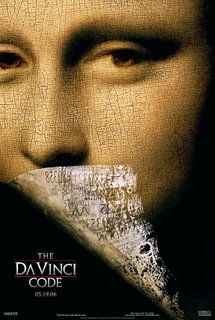 A couple of noteworthy additions to The Da Vinci Code omnibus.
A couple of noteworthy additions to The Da Vinci Code omnibus.First up, Da Vinci Dialogue (a Website offering essays from a variety of leading Christian scholars, pastors and educators addressing many of the historical and theological issues touched on in The Da Vinci Code) has a new post: Why Matthew, Mark, Luke and John – and Not the Gnostic Gospels? Bryan Litfin (assistant professor of Theology at Moody Bible with a specialty in ancient Christianity) looks at the claim of one of the book's characters on how the Gospels were selected:
[Sir Leigh Teabing] claims more than eighty gospels were considered for inclusion in the New Testament. Yet only four were chosen. Why? He says the decision was made by the Roman emperor Constantine the Great in the year 325 AD at the Council of Nicaea. Apparently the New Testament gospels were selected by the arbitrary decision of a pagan emperor for propaganda purposes.After briefly exploring Gnosticism—historical and modern—Litfin goes on to give the historical background for NT’s four gosels (worth the lengthy repeat here):
Anyone who knows how the New Testament was formed will laugh at such a preposterous claim. While it might seem plausible to those who don’t know better, it’s not accurate. Just as the ancient mystery religions spun fabulous tales for the gullible, so The Da Vinci Code relies on people’s misconceptions about the origins of the Bible. It’s time for the clear sunlight of historical truth to dispel the mists of fiction.
There is solid historical evidence that the four biblical gospels became standard well before Teabing says they did. For example, the ancient bishop Irenaeus said, “It is not possible that the Gospels can be either more or fewer in number than they are,” for Christ “has given us the Gospel under four aspects, but bound together by one Spirit.” Irenaeus wrote this around 180 AD.He concludes:
His assertion represents the consensus in his day that there are four gospels. We even have a surviving biblical manuscript from a few decades later which already contains the four gospels as a single collection! Matthew, Mark, Luke and John were established long before the council in 325 AD.
What role did Emperor Constantine play? In the 300s the Christians started making lists of biblical books. But at no time were the four gospels questioned. It was the more confusing books, such as Jude or Revelation, that were still debated. Emperor Constantine ordered his favored bishop Eusebius to commission fifty official copies of the Bible. Obviously this meant selecting which books are “in” or “out.” Eusebius knew that ancient tradition had affirmed a fourfold
gospel. Though he acknowledged some books were still controversial, he counted Matthew, Mark, Luke and John as established books.
So it is sheer nonsense to say that Emperor Constantine legitimized the four gospels for the first time. They had a long pedigree of acceptance—as every historian of Christianity knows.
The truth of the matter is that while many documents about Jesus circulated in the ancient world, the orthodox Christians accepted only Matthew, Mark, Luke and John from an early date. No other options were seriously entertained.In other news, GetReligion’s Daniel Pulliam muses on the ramifications of Da Vinci Code author Dan Brown's court case, in particular the danger this may pose to future novels in the genre of historical fiction. Worth the read. Also, a new TV spot is out for the movie. Go to the film’s Website, choose “Video Clips” and then “TV Spot 1.”